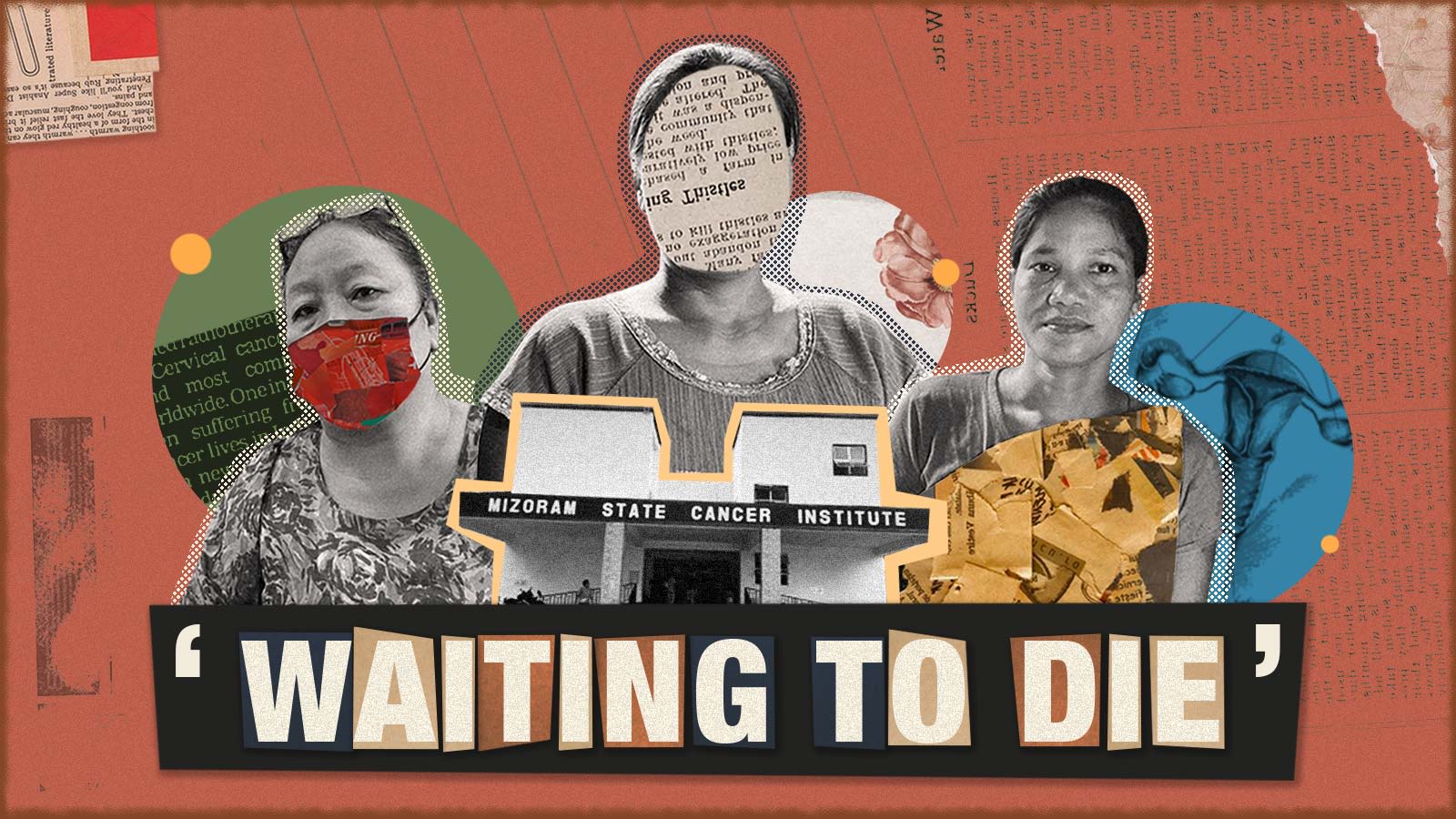
A multimedia immersive by



Himanshi Dahiya
reporting from Mizoram





Premia Shulet’s separation from her husband Peter Shulet was all anybody could talk about in Thinghlun, a thinly populated village of 800 people in Mizoram’s Mamit district -- six hours and 160 km away from the state capital Aizawl.
“They couldn’t stomach why I left Peter,” said 22-year-old Premia, a mother of two, as she chased her younger son Benjamin with a bottle of milk.

Tired after a few minutes, she stopped to catch her breath and continued her pursuit. “Last year some healthcare workers came to our house and told me that I should get screened for cervical cancer. Peter refused despite them telling us that I might be at a high risk of contracting the virus that causes the cancer. I didn’t say much at the time… But earlier this year, he and his family refused to let our children get vaccinated. That is where I drew the line and decided to walk out,” she said, seated inside her one-room bamboo house in Thinghlun.
Premia and her family belong to the Pawl Chhuak community, colloquially known as the "outlaws" or those who do not follow the mainstream churches in Mizoram, a state with 87 percent Christian population. “The Pawl Chhuaks do not believe in getting vaccinated or screened for diseases. It is against the rules followed by their tribes,” explained Chhuantei, a worker at the government-run Community Health Centre (CHC) in the village.
While Chhuantei lauded Premia's stand against her family, the church, and the norms, worry still consumed her. "I am glad she took a stand for her children and got them vaccinated but what about her own health? At 22, she is a mother of two. This puts her at a higher risk of contracting cervical cancer than most women her age. If detected early, she can seek treatment and even recover,” Chhuantei added.
Her concerns are not without reason.
According to data released by the Indian Council of Medical Research (ICMR) and National Centre for Disease Informatics and Research, only 6.9 percent women in the state underwent screening for cervical cancer in 2021.
Premia too refused to get screened. A daily-wage labourer, she earns Rs 250-300 per day by working on land owned by rich farmers in the area.
"What is the whole point of getting tested now? I don't have the money for treatment. Even if I have cancer, it's better that I just die one day," she said.

Various strains of the Human Papilloma Virus (HPV), a sexually transmitted infection, are the cause behind most cervical cancer cases.


The government of India, in partnership with Pune-based Serum Institute of India (SII), on 1 September 2022, announced the launch of India's first indigenously developed cervical cancer vaccine, CERVAVAC.
As per SII, CERVAVAC offers protection against four strains of the HPV virus. This came 14 years after Cervarix, manufactured in UK, and Gardasil, manufactured in the US, were made available to be sold in private medical sector.
In December 2022, the Union Health Ministry toyed with the idea of introducing the HPV vaccine in its Universal Immunisation Programme (UIP) in a phased manner.
As per a release by the Press Information Bureau (PIB) dated 22 December 2022, the National Technical Advisory Group for Immunisation (NTAGI) recommended the introduction of HPV Vaccine in the UIP.
“The vaccination would be provided primarily through schools. In order to reach those girls who are unable to attend school on the campaign launch day, the vaccination would be provided at a health facility, while for out-of-school girls the campaign would be conducted through community outreach and mobile teams based on age (9-14 years). For registration, recording and reporting of vaccination numbers, the U-WIN app would be used,” the release stated.
In February 2023, notifications were sent to six states including Mizoram, Karnataka, Tamil Nadu, Chhattisgarh, Maharashtra, and Uttar Pradesh to start community outreach and testing of the U-WIN app.
In July 2023, CERVAVAC, priced at Rs 2,000 per dose, was made available for sale in private market. While plans are underway to roll it out for the public sector, there is no official confirmation regarding the timeline.
“The vaccine was supposed to be available by June this year but so far we haven’t heard from the Ministry,” Dr Eric Zomawia, Project Director at the National Health Mission in Mizoram told The Quint.
“The plan is to first tie up with schools and and provide vaccine to girls between the age of 9-14. The challenging part is to get the parents to consent,” he added.






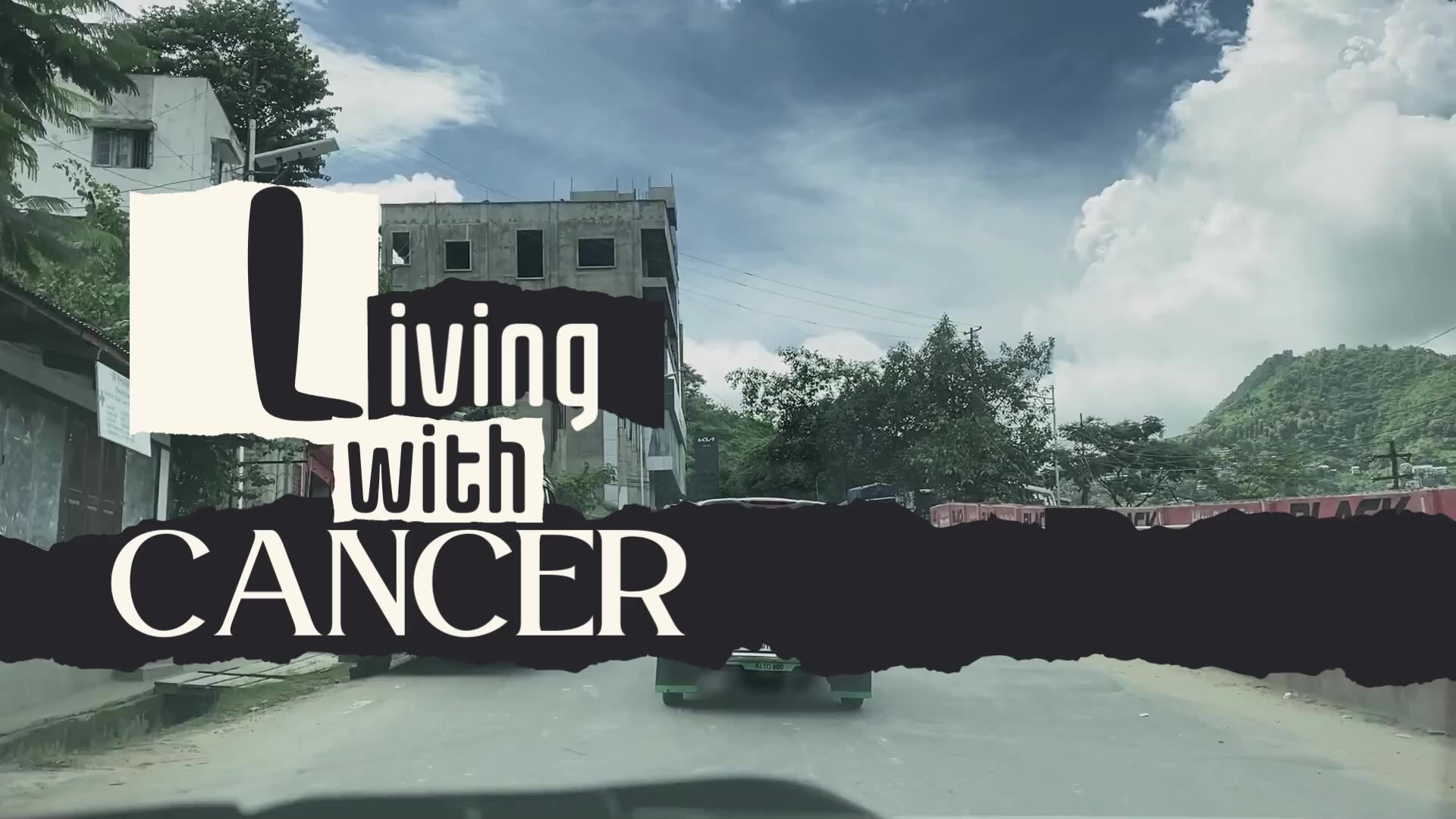
In a queue outside Dr Chhangte’s consulting room at the hospital sat 45-year-old Rotluangi. She was diagnosed with cervical cancer in July 2022.
“I was experiencing watery vaginal discharge and excruciating pelvic pain for a few months. It was sometime in July 2022 that my husband and I decided that we should consult a doctor”
Rotluangi and her husband come from Muallungthu, 20 km away from Aizawl. She was operated for cervical cancer in August 2022. Since her surgery, she is required to visit the hospital once every three months.
“It takes us around two hours to reach the hospital. My husband accompanied me for the first few visits. Now I manage by myself”
Dr Chhangte explained that Rotluangi's cancer was detected in its initial stages. “She is one of the few women who sought medical advise when symptoms first started showing. Most women wait till it gets much worse,” he said.
Cervical cancer, if detected early and managed effectively, is completely curable.

“The screening for cervical cancer involves Visual Inspection with Acetic Acid. It’s a simple and inexpensive test which involves naked-eye examination of the cervix, after application of five percent acetic acid. Most women, however, do not feel comfortable exposing their vagina to healthcare workers or doctors, especially when they feel that they are seemingly healthy as the Human Papilloma Virus responsible for cervical cancer can remain dormant for years before showing any symptoms,” Dr Chhangte added.
While aggressive and regular screening can help in early detection of HPV and prevent death due to cervical cancer, the only sure shot way of preventing women from contracting the disease is timely vaccination.

Rotluangi's own struggle with the cancer means that she understands the importance of getting her 14-year-old daughter vaccinated.

Union Health Ministry's Universal Immunisation Programme (UIP), provides free of cost immunisation against 12 vaccine-preventable diseases.
These include Diphtheria, Pertussis, Tetanus, Polio, Measles, Rubella, severe form of Childhood Tuberculosis, Rotavirus diarrhea, Hepatitis B, Meningitis and Pneumonia caused by Hemophilus Influenza type B and Pneumococcal Pneumonia, and Japanese Encephalitis.
THE LIST DOES NOT INCLUDE HPV YET
“All girls between the age of 9-14 years should be given the HPV vaccine. Since there is no government funded or subsidised vaccine available in the market as of now, the only option that parents have is to go to private hospitals. Vaccines available in those hospitals are expensive,” Dr Chhangte explained.
One shot of Cervarix, a vaccine that protects against infection by two HPV strains – type 16 and type 18 -- costs between Rs 3,600 to Rs 3,900.
“Between 9-14 years of age, two shots of this vaccine must be administered within a span of six months to protect a person against cervical cancer,” Dr Chhangte told The Quint. “Women between the ages of 15-26 years can also take the vaccine. But then three doses are required,” he added.
Rotluangi's family is waiting for a “free-of-cost” vaccine to be made available at the government hospital to get her daughter vaccinated
“We can’t afford to spend Rs 10,000 on one vaccine alone. That too within three months,” she said.
Rotluangi's husband works as a driver in their hometown Muallungthu
"Our monthly income is around Rs 30,000-40,000 and we have three children to take care of. There are hardly any savings".
Her own treatment of cervical cancer, Rotluangi said, was made possible by the Pradhan Mantri Jan Arogya Yojana (PM-JAY), popularly known as the Ayushman Bharat Scheme — a flagship public health insurance scheme launched by the Government of India in 2018.
Under the PM-JAY scheme, 50 percent of India's low-income families get a health cover of Rs 5 Lakh per year for medical treatment in empaneled hospitals, both public and private.
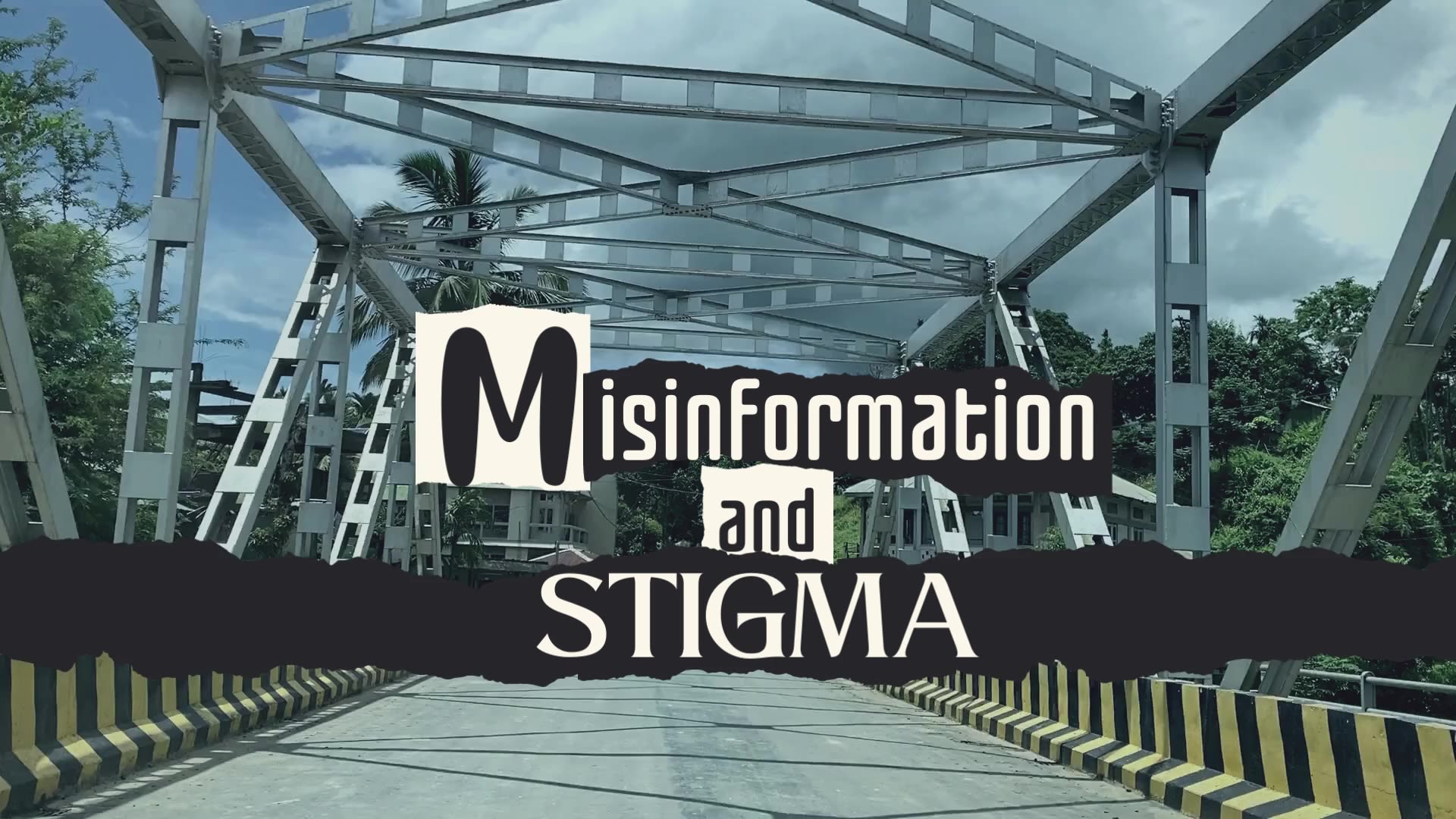
Back in Thinghlun, Premia’s neighbour Vlmalsawmi, 40, had no clue about cervical cancer or the HPV vaccine. When explained what the cancer is and how it develops, Vlmalsawmi, a mother of four girls, lost her calm.
“My girls are not into the kind of activities which will lead them to catch such diseases,” she said, fuming.
A mother of eight, four boys and four girls, none of Vlmalsawmi's children have been vaccinated against any diseases.
"The body is meant to be how God made it.
These injections won't help," she said.
The beliefs are more stringent for women. "If we get them to take these injections, who will marry my daughters?" asked Vlmalsawmi.
Vaccinating women for HPV is not the same as polio, Dr Zomawia explained:
“It’s a sexually transmitted virus. Most parents are reluctant to give their consent for administrating this vaccine to young girls, especially before marriage. The taboo around sex exists even in urban spaces,” he said.
Chhuantei and other healthcare workers in Thinghlun spend a lot of their time conducting awareness drives
“We try to tell them that they should get tested for these diseases regularly. And now that a vaccine is almost about to be made available by the government, it is our job to make sure that these people agree to get vaccinated… But we have to understand. These are poor, daily wage labourers. They are scared of vaccines. For HPV, they fear that it is some sort of birth control campaign. Also, after taking a vaccine, a person needs to rest for at least a day or two. That means they lose out on that day's work. Health is not a priority among low-income families — and women's health even less so,” said an exasperated Chhuantei.
Dr Zomawia said that similar awareness drives are also being conducted in cities such as Aizawl, as they wait for a notification regarding the vaccine from the Health Ministry.
Back in Thinghlun, Premia’s neighbour Vlmalsawmi, 40, had no clue about cervical cancer or the HPV vaccine. When explained what the cancer is and how it develops, Vlmalsawmi, a mother of four girls, lost her calm.
“My girls are not into the kind of activities which will lead them to catch such diseases,” she said, fuming.
A mother of eight, four boys and four girls, none of Vlmalsawmi's children have been vaccinated against any diseases.
"The body is meant to be how God made it.
These injections won't help," she said.
The beliefs are more stringent for women. "If we get them to take these injections, who will marry my daughters?" asked Vlmalsawmi.
Vaccinating women for HPV is not the same as polio, Dr Zomawia explained
“It’s a sexually transmitted virus. Most parents are reluctant to give their consent for administrating this vaccine to young girls, especially before marriage. The taboo around sex exists even in urban spaces,” he said.
Chhuantei and other healthcare workers in Thinghlun spend a lot of their time conducting awareness drives
“We try to tell them that they should get tested for these diseases regularly. And now that a vaccine is almost about to be made available by the government, it is our job to make sure that these people agree to get vaccinated… But we have to understand. These are poor, daily wage labourers. They are scared of vaccines. For HPV, they fear that it is some sort of birth control campaign. Also, after taking a vaccine, a person needs to rest for at least a day or two. That means they lose out on that day's work. Health is not a priority among low-income families — and women's health even less so,” said an exasperated Chhuantei.
Dr Zomawia said that similar awareness drives are also being conducted in cities such as Aizawl, as they wait for a notification regarding the vaccine from the Health Ministry.
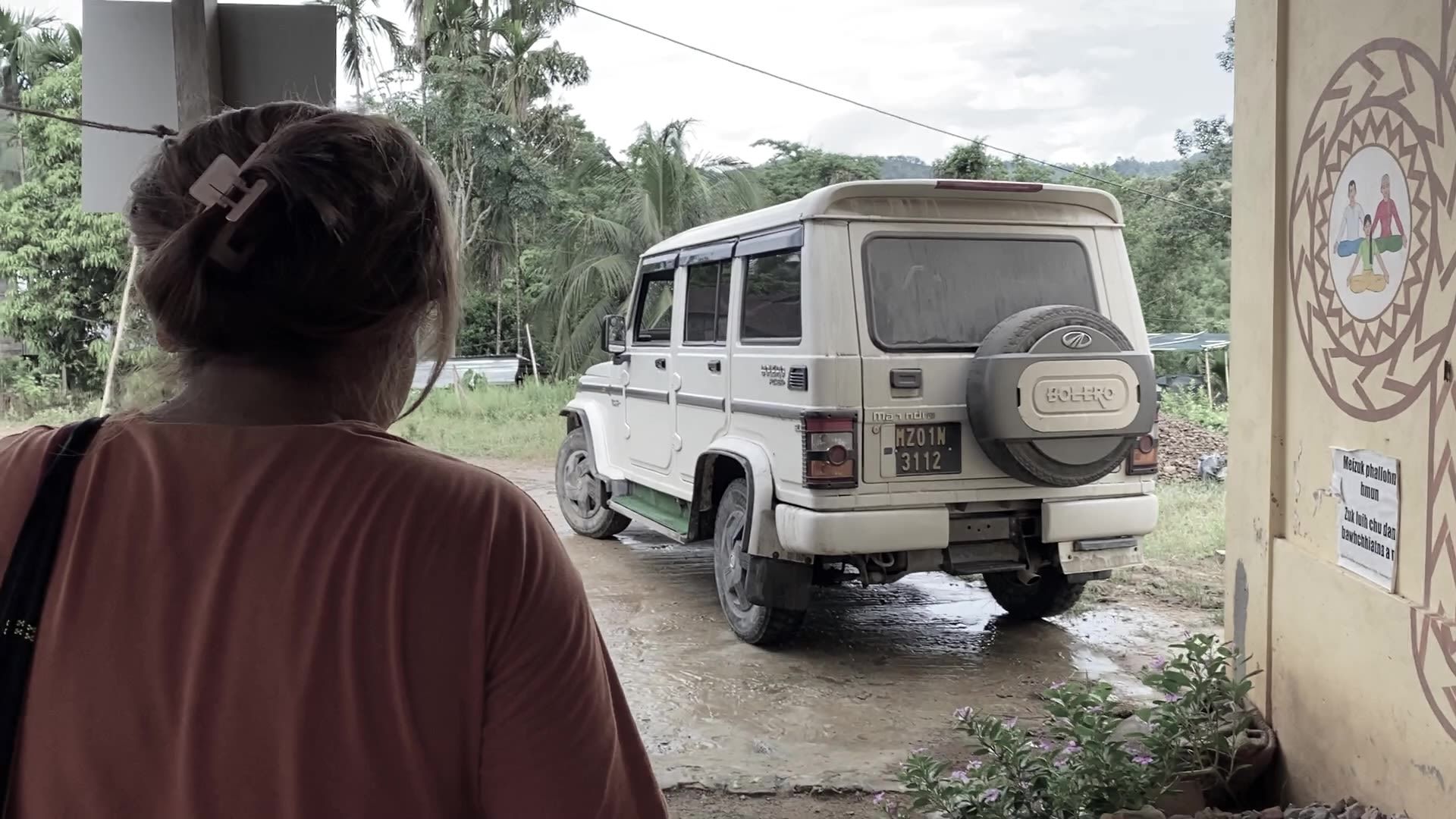
A 2022 study in The Lancet — one of the oldest English language peer-reviewed medical journals — showed that
India accounts for the highest number of cervical cancer cases in Asia, followed by China.
More than 58 percent of all cases of cervical cancer cases and deaths globally were estimated in Asia with India accounting for 21 percent of cases and 23 percent of deaths.
And Mizoram — the land of rolling hills, valleys, rivers, and lakes — has, year after year, recorded the highest incidence rate of cervical cancer across states in the country.
As per the Population Based Cancer Registry, maintained by the Indian Council of Medical Research (ICMR) and the National Centre for Disease Informatics and Research (NCDIR), the number of cervical cancer cases recorded in Mizoram per 1,00,000 women went up from 77 in 2014 to 122 in 2022 — a staggering 58.4 percent spike in eight years.

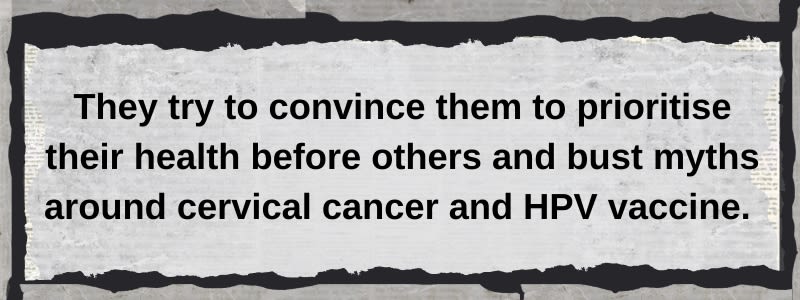




(This project was supported by an independent reporting grant by the Sabin Vaccine Institute)
CREDITS
REPORTER
Himanshi Dahiya
GRAPHIC DESIGNERS
Kamran Akhter
Namita Chauhan
SENIOR EDITOR
Somya Lakhani
CREATIVE PRODUCER
Zijah Sherwani
Dear reader,
Journalistic projects as detailed and comprehensive as this one take a lot of time, effort and resources. Which is why we need your support to keep our independent journalism going. Click here to consider becoming a member of The Quint, and for more such investigative stories, do stay tuned to The Quint's Special Projects.

